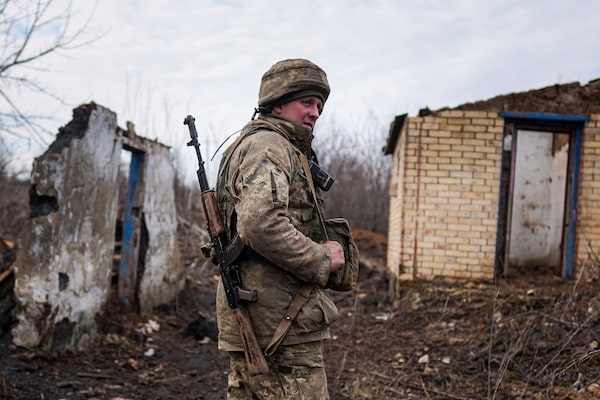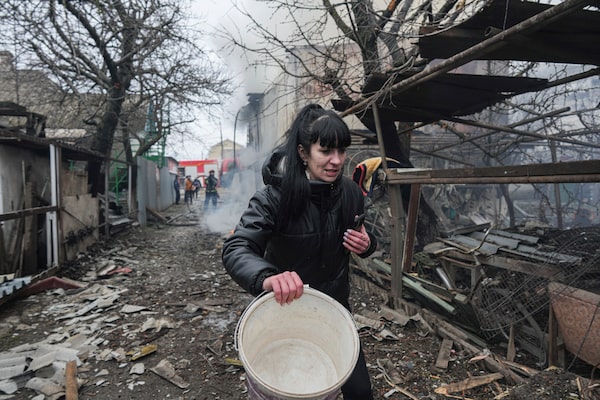
Panzer units of the German Army pass through a blazing Russian village, torched by the evacuees, on their one-way journey to the battlefront, in July 1941.Keystone/Getty Images
Margaret MacMillan is emeritus professor of history at the University of Toronto and emeritus professor of international history and the former Warden of St. Antony’s College at the University of Oxford. Her most recent book is War: How Conflict Shaped Us.
We have become used to seeing those newsreels from the start of the Second World War. The Blitzkrieg, as German troops, in their armoured vehicles and on their motorcycles, roared across Poland; the attacks from the air on Polish targets; and the barefaced lies from the Nazis. The Poles, Hitler claimed, were the aggressors against the innocent German victims. Germany was merely defending itself. To create “proof,” the Nazis staged attacks on German targets with German soldiers dressed in Polish uniforms – most famously at a radio station in Gleiwitz, then a German border town. To add verisimilitude, the Germans killed prisoners from their Dachau concentration camp and left them as “evidence” of the alleged attack.
That was, or so we thought, a long time ago, in another sort of world. The horrors of the Second World War still live on in our memories but that devastated world has long since been rebuilt, and many of us, Canadians certainly, have lived in a world where major state-to-state wars have come to seem impossible. And we have taken for granted that our international institutions, tattered though they may be, allow that countries of the world can sort out their differences; more, that there is something called an international community that can still work together. Vladimir Putin’s war on Ukraine – and let us make no mistake, it is his and no one else’s – has suddenly brought the past very close and made the future very uncertain.

French troops about 200 metres from the German Front in 1940.Evening Standard/Getty Images
The parallels with 1939 are uncomfortable ones: The dictator possessed by his mission, the barefaced lies and the claims of victimhood as the aggressors make victims out of those who only wanted to live their lives as they pleased. Where Hitler dreamed of a great Aryan empire stretching from the Atlantic to the Urals, Mr. Putin wants the restoration of the greater Russia of the Czars and the Soviet Union and the mystical unity of the Slavic peoples. We know what happened after 1939 and can only hope that somehow a peace of sorts will be patched up in Ukraine. But the world will never be the same. We have moved already into a new and unstable era.
Events are moving so quickly on the ground in Ukraine and the pictures of their people’s suffering at the hands of the unprovoked invasion by Mr. Putin’s forces are so shocking that it is hard to step back and guess what the longer term effects will be. Will democratic countries around the world come together to impose sanctions that really hurt Russia, rather than the largely token ones they have done so far? The United States is taking a firm line, but it remains to be seen what other countries – notably Britain, where so much Russian wealth is invested – will do. Will the Western military alliance embodied in NATO pull itself together and act as one? And what about the fate of the other institutions which have underpinned the international order since 1945? The United Nations has already lost much authority and it may be fatally damaged by its impotence in the face of this war.

A Ukrainian serviceman stands at his position at the line of separation between Ukraine-held territory and rebel-held territory near Svitlodarsk, eastern Ukraine, on Feb. 23.Evgeniy Maloletka/The Associated Press
Norms and conventions matter in international affairs as much as institutions, sometimes even more, and Mr. Putin is trampling those, too. Since the end of the Second World War, there has been a general understanding that borders changed by force would not be recognized by the international community. When Saddam Hussein invaded Kuwait in 1991, an international coalition, led by the United States, evicted his forces and restored order. That useful principle was breached when Mr. Putin seized Crimea in 2014 and now his invasion of Ukraine opens that door still further. There will be others ready to go through it. And history, often coupled with the ethnic composition of populations, has become the leading justification for claiming and taking territory. Saddam used it in Kuwait; China uses it with Taiwan.
Mr. Putin is insincere about much – for example, his ludicrous claim that he has sent troops into Ukraine to save its people from Nazism and militarism – but he does believe in history, or rather his version of it. That is something, at least, he has in common with others. In many societies where more traditional forms of authority, such as religion, have fallen away, history has been elevated to the position of impartial authority. How often do we hear the advice to be on “the right side of history” as if there is some unseen force flowing through human affairs that will sort out the righteous from the sinners? They may know not about Mr. Putin’s views on history but some of our own Canadian trucker protestors showed the same faith that “history” would judge them as doing the right thing.

A woman walks past the debris in the aftermath of Russian shelling, in Mariupol, Ukraine, on Feb. 24.Evgeniy Maloletka/The Associated Press
When we look back at this crisis we may also reflect that we should have understood better the grip that the past can have on thoughts and actions in the present. Mr. Putin – and it is probably true of the increasingly small circle that surrounds him – has never come to terms with the end of the Soviet Union in 1991. He came of age as a servant of the state in a superpower and lived to become master of a Russia which was merely a regional power, with a shaky economy, a declining population and a standard of living closer to countries in the Global South than in the West or Asia. Although the Soviet Union recognized the independence of Ukraine in 1991, shortly before it dissolved itself, Mr. Putin has never accepted that as legitimate. For too long, Western leaders assumed that, when Mr. Putin said the end of the Soviet Union was “the greatest geopolitical catastrophe” of the 20th century, it was just rhetoric.
Ninety per cent of Ukrainians voted for independence in 1991 but for Mr. Putin that counts as nothing against a history which, he claims, has welded together the Russian and Ukrainian people into one indissoluble being since the 9th century. His historical context not only goes back much further than that of most Westerners, it is different. Events that happened centuries ago, such as the Battle of Poltava in 1709, when Peter the Great’s armies defeated Swedish ones to become the dominant power in the region, are still vivid in his thinking. There is already speculation that Mr. Putin, who likes to compare himself to his “predecessor” Peter the Great, will hold his victory celebrations, if indeed they happen, at Poltava, which is in central Ukraine. There will be a new piece of history for others to draw on in the future, either as encouragement or warning.
Keep your Opinions sharp and informed. Get the Opinion newsletter. Sign up today.